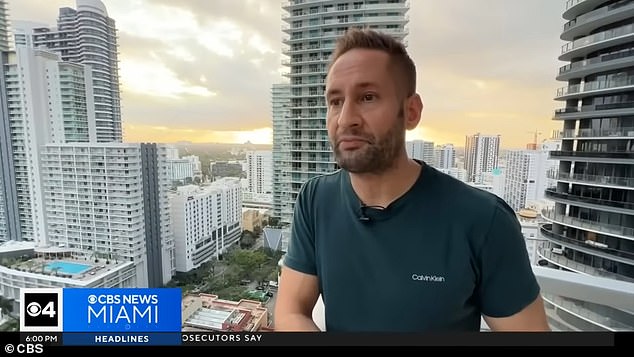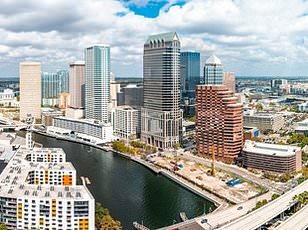Condo owners outraged after being slapped with $21 MILLION fee as Florida housing crisis escalates
Condo residents in Florida are in uproar after being served a huge $21 million special assessment bill for repairs - just 16 years after construction.
Some residents of the two condo buildings in Brickell, Miami, face individual payments of more than $40,000, leaving them feeling blindsided and financially overwhelmed.
Some are even considering selling up as a result.
The condo board insists the repairs are urgent and required under law, and work is already underway on projects such as a roof replacement and a pool deck restoration.
But residents are questioning why, after construction finished less than two decades ago, this young building is in need of such dire repairs so quickly and with such a hefty bill attached.
'I think it's excessive,' resident Nima Mahdjour told CBS News. 'I feel like I'm being milked.'
Mahdjour, whose condo comes with views of downtown Miami and the ongoing construction, told the outlet the decision feels rushed and lacking transparency.
'Absolutely left in the dark,' Mahdjour added. 'It was rammed through.'
It comes as condo owners in Florida are facing a perfect storm of rising homeowner's association (HOA) fees, natural disasters, increasing insurance costs and new regulations - which is forcing many to try and flee.

Condo residents in Florida are in uproar after being served a huge $21 million special assessment bill for repairs - just 16 years after construction
On November 13, the board at the Brickell condo approved the special assessment based on findings from a Structural Integrity Reserve Study, which highlighted immediate repair needs despite most systems being classified as 'generally serviceable,' CBS reported.
'There are certainly things that have to be done,' Mahdjour acknowledged. 'No owner is denying that.'
While he and other residents have acknowledged repairs would be necessary, they argue that the condominium declaration requires unit owner approval for any special assessment exceeding $50,000.
However, while the meeting was held, the residents have claimed they were not given the opportunity for a formal unit-owner vote.
'We haven't had any say in the matter,' said Mahdjour.
The Association's General Counsel, Marc Halpern, cited state laws put in place after the Surfside Champlain Towers collapse in 2021, which claimed the lives of 98 people, as justification for the board's actions.
'Florida law primarily is the justification,' Halpern told the outlet.
'The board is charged with the responsibility to adequately maintain and repair the common elements. If owners were to vote against that, you would be putting the building and the owners in danger.'
Halpern defended the board's decision, stating that owners were given opportunities to tour damaged areas and view the scope of repairs before the assessment was finalized.

'I think it's excessive,' resident Nima Mahdjour told CBS News. 'I feel like I'm being milked'

The condo board insists the repairs are urgent and required under law, and work is already underway on projects such as a roof replacement and a pool deck restoration

Florida's state government approved a new law cracking down on older condos after the Champlain Tower South in the Miami suburb of Surfside crumbled in 2021
Resident Marthin Chan is now contemplating selling his unit due to the financial strain.
'We question the speed of how they're moving to do things. If it's so dangerous, then kick us all out of the building, and we should all not be here,' he said.
The condo board has offered residents to pay the money over time in installments.
But huge bills of this kind could soon be the reality for other Floridian condo owners in the future.
The housing crisis in the state is continuing to escalate due to natural disasters, rising HOA fees and increasing insurance costs as well as these new condo regulations.
Florida real estate has been in a downward spiral for months, with some condo owners listing their properties for 40 percent cheaper than they're worth just to unload them.
'The recent hurricanes have been a major disruption in existing or pending sales, even for unaffected homes,' said Phil Crescenzo Jr., Vice President of the Southeast Division at Nation One Mortgage Corporation.
Three major hurricanes - Debby, Helene and Milton - tore through the Sunshine State this year, destroying thousands of homes and businesses.
Florida native and former real estate agent Ro Barber told DailyMail.com that house, mortgage and insurance prices have rocketed up in response.
'We push out the middle class every time after a storm like this,' Barber said. 'It's not because of the storms that people move away - it's the real estate trends that come after... all of the rental prices go sky-high and people just get priced out.'
Many lifelong Floridians are contemplating moving out of state for the first time to avoid this boom-bust cycle the state experiences.
And out-of-staters appear just as hesitant to commit to Florida.
'First-time buyers are especially skittish,' said Lindsay Garcia, a Redfin real estate agent based in Fort Lauderdale.
'There’s still some demand for vacation homes, but in general, the market is very slow.'

Three major hurricanes - Debby, Helene and Milton - tore through the Sunshine State this year, destroying thousands of homes and businesses (Pictured: Homes in Port St. Lucie that were razed during Hurricane Milton)

Governor Ron DeSantis is at the forefront of state leaders seeking to ameliorate the condo crisis
Condos are more vulnerable than any other market, because they're susceptible to natural disasters and new regulatory burdens to keep high-rises safe.
All condo buildings 30 years old or older and three stories or taller are required to undergo an inspection by a qualified architect or engineer.
If 'substantial structural deterioration' is found, the condo owner will be on the hook for the repairs.
Thousands of owners who remain are attempting to dodge the rapidly approaching December 31 deadline for these inspections by selling their properties.
Governor Ron DeSantis has pushed for the state legislature to address this glaring issue before the end of the year.
His idea to stop panic selling is to offer a low or no-interest loan program for those saddled with high repair costs.































































































































































































